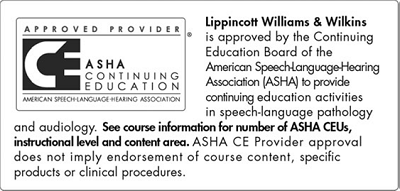{{ (moduleVm.actions && moduleVm.changeStatus) ? moduleVm.status : '' }} Evaluating Children in U.S. Public Schools with Speech Sound Disorders: Considering Federal and State Laws, Guidance, and Research
Activity Steps
Description
Note: ASHA CEUs cannot be reported to ASHA unless your ASHA member number is included in your profile. More than half of U.S. SLPs currently practice in the school setting and 92.6% of SLPs who work in schools provide services focused on children?s speech sound production (articulation and/or phonology). This article describes evaluation and eligibility requirements for children with speech sound disorders in the United States focusing on four sources of information: federal requirements, specifically the Individuals with Disabilities Education Act (IDEA), state and local requirements and guidance, other sources of guidance, and research. Accreditation
This course is offered for 0.10 ASHA CEUs
(Intermediate Level, Professional Area).
Purpose of Activity
To gain knowledge about evaluation and eligibility requirements for children with speech sound disorders (SSDs) based on information from Individuals with Disabilities Act (IDEA), state and local guidance, professional organization guidance and research.Learning Objectives
After completing this continuing education activity you will be able to:
- Identify eligibility criteria for children with speech sound disorders (SSDs) based on IDEA federal guidelines.
- Describe best practices for children with speech sound disorders (SSDs) to determine eligibility for services.
- Differentiate between the school-based setting and clinical setting criteria for determination of eligibility for children with speech sound disorders (SSDs).
Disclosures
Marie Ireland, MEd, CCC-SLP, BCS-CL disclosed that she is the Vice President of American Speech-Language Hearing Association (ASHA) for Speech-Language Pathologist (SLP) Practice to which she receives a stipend for her employer the Virginia Department of Education. She also disclosed that she was a presenter on the topic of evaluation and eligibility in schools to which she received payment from the University of South Florida and has been an unpaid presenter on this topic for ASHA. Marie Ireland, MEd, CCC-SLP, BCS-CL has also served as a board member for 14 years on the State Education Agencies Communication Disabilities Council (SEACDC) and had authored numerous products and presentations in this role. She is government funded and completed this current study as part of her regular employment responsibilities. She has no other financial disclosures or potential conflicts of interest.
Sharynne McLeod, PhD disclosed that her employer, Charles Sturt University, Australia received funding from the Australian Research Council for a Discovery Grant. She has no other financial disclosures or potential conflicts of interest.
Kelly Farquharson, PhD, CCC-SLP has no financial disclosures or potential conflicts of interest.
Kathryn Crowe, PhD has no financial disclosures or potential conflicts of interest.
Credits:
- ASHA 0.1 CEU